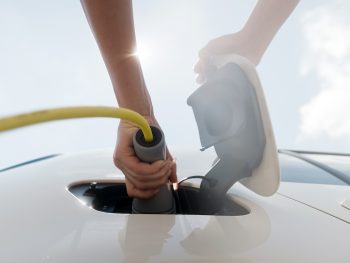OBR downgrades EV projections on back of ICE ban delay
The Office for Budget Responsibility (OBR) has substantially reduced its projections for electric vehicle registrations in the UK amid concerns for take-up.

The main policy driver for EV uptake is now the ZEV mandate
Its ‘Economic and Fiscal Outlook’ was published last week in conjunction with the Autumn Statement and anticipates slower take-up of electric vehicles as a proportion of total new car sales, compared to previous expectations.
The OBR has now slashed its forecast of EV take-up for 2023 as a whole from the 25% predicted in its analysis from March to 18%.
And projected take-up in 2027 has been almost halved, down to 38% adoption compared to the 67% predicted in its previous analysis, published before the 2030 pushback.
The 38% prediction aligns with the trajectory for carmakers in the recently confirmed ZEV mandate – which will set a minimum share of cars and vans sold by each manufacturer to be zero emission from 2024 and is now seen as the primary catalyst driving the adoption of EVs.
The OBR said it was downgrading its prediction due to slowing EV demand. While the EV share of new car sales had previously exceeded expectations, in 2022/23, growth in EV take-up slowed, accounting for just 16.5% of new car sales, which was more than one percentage point below its March 2023 forecast of 17.7%.
Factors for the slowdown, according to the OBR, include the generally higher upfront costs of EVs relative to ICE, which will likely still disincentivise many consumers, especially purchasers using car finance, as interest rates are significantly higher than it had anticipated in 2022.
It also warned that higher electricity prices and falling fuel prices were reducing the cost benefit argument for EVs and that the availability of public charging points remains a concern for many drivers. That’s despite the Autumn Statement pledging reforms that will cut grid connection waiting times for charging infrastructure and speed up planning approvals.
But the OBR also noted that the Government’s recently announced five-year pushback for the ICE ban to 2035 might result in some consumers delaying a switch to EVs.
Instead, it said the main policy driver for EV uptake is now the ZEV mandate – and the verdict is that sales of zero emission vehicles “are unlikely to materially exceed this across the forecast horizon due to flexibilities that allow trading of allowances and borrowing against future allowances in the first three years of the mandate”.
The Society of Motor Manufacturers and Traders (SMMT) has warned again of the need for incentives for private buyers to switch to EVs.
Speaking earlier this week, the trade body said: “Having initially grown robustly, EV uptake is now plateauing as the market begins to move beyond the ‘early adopter’ phase. Government incentives are driving the business and fleet markets, but a fair transition demands that private consumers are also encouraged to make the switch.”
Mike Hawes, SMMT chief executive, added: “Incentives for business buyers must be matched with support for private buyers to ensure the maximum return on every penny already pledged to production. The prize for success will be a faster and fairer decarbonisation of Britain, ensuring millions have access to zero-emission mobility.”
The SMMT continued: “Fiscal incentives for business buyers, notably in company car tax, have ensured this segment of the new EV market continues to perform strongly. To move uptake to the mainstream, however, all purchasers need to be encouraged to switch. Halving VAT on new EVs, for instance, would be a compelling and affordable measure, enabling manufacturers deliver larger volumes of zero-emission vehicles and creating the conditions for greater UK supply chain investment – one of the main ambitions of the Government’s newly published Advanced Manufacturing Strategy. Combined with retention of the business incentives and measures to accelerate the roll out of charging infrastructure, the new EV market would expand and flow into the used sector, catalysing greater adoption by all drivers.”
The OBR outlook also indicates that slower-than-expected demand for EVs will boost Treasury revenues from fuel duty.
While receipts from fuel duty, and to a lesser extent Vehicle Excise Duty (VED), will decline as more drivers go electric, the OBR predicts that the reduced EV demand compared to earlier predictions will net an extra £700,000 in fuel duty a year on average.
However, fuel duty will still fall to zero in cash terms when EVs eventually replace petrol and diesel cars – highlighting again the need for a switch to a new system, most likely road user pricing of some form.












